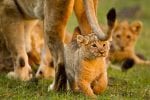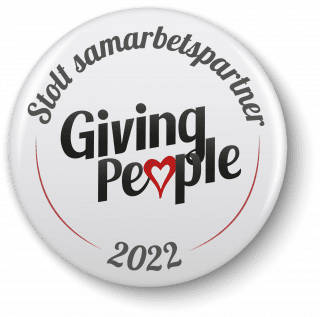At Karen Blixen’s fine ecolodge in the Masai Mara, you get the feeling of being relegated to another time period, to the time when the savannah was a white spot on the map, and the only people who were in the area were the original Masai people. The lodge is located on the banks of the river Mara, a naturally spectacular place with the large plains behind the lodge, and the large slope Ololoa in front. During the day, zebras, elephants and hippos come to drink by the river right near the lodge. After this adventure, head on to adventurous Zanzibar to enjoy the sun, beach and the colorful local scenery. This is a journey where we take into account both people, nature and the local environment.
Contact form

Ecorating: 4.0
This product meets our requirements for Ecorating, a product that is good for humans and the environment.
Does my trip make a difference?
Read more
This product meets our requirements for Ecorating, a product that is good for humans and the environment.
Sample Itinerary

Arrival at Kenya International Airport where you will be picked up and then the journey continues to Wilson Airport Domestic Airport. Arrival Masai Mara and further transfer to Mara North Conservancy in Masai Mara. Once there, meet your local Masai guide, continue on the savannah and finally arrive at Karen Blixen Camp. Breakfast and a short guided tour of the area.
Maybe grab a siesta or sit by the beautiful river Mara to study birds and animals along the river course. A little later you will set out on your first safari, followed by relaxation, perhaps an open sky shower and dinner. Gathering by the campfire – unless you prefer to go to bed after this long day.

Feel free to get up early so as not to miss the busy morning activity on the savannah. A quick cup of coffee or tea before it’s safari time. Return to the lodge for breakfast, a slightly larger tour of the lodge and the area, where you can see, among other things, how Karen Blixen Camp works in terms of environment and sustainability. Here are, for example, solar panels, a cold room without a motor, heating of hot water using solar panels and much more. Breakfast and siesta. In the afternoon again time for safari to see if we can spot lions, elephants and giraffes. Dinner at the lodge, relaxation and maybe you grab a classic gin & tonic, lean back and contemplate the beautiful starry sky.

You wake up early to get out on the savannah, or spend the morning enjoying nature and the atmosphere from your terrace. Breakfast. Today you can choose between, for example, helping to plant trees, spending some time with the local Masai women in the jewelery workshop – watch them produce fine jewelery and crafts, or you can look past the cooking school. Lunch and afternoon time for a game drive with a Masai guide. Feel free to stay a little longer on the savannah in the afternoon and into the early evening. The scent of the savannah becomes stronger, more intense. One can really sense how the night means hunting for the big cats that live here. We return to the lodge no later than 9pm for a late dinner.

Another day on the savannah awaits – wondering what awaits us? Morning safari or afternoon safari according to what you want. Remember to take time to enjoy a few hours by the pool, get a spa treatment, make time for yourself. In the evening, a little surprise awaits.

Wake up at your own pace, eat breakfast in peace and quiet and then check out and leave the Masai Mara. Arrive in Nairobi at lunch and onward journey to adventurous Zanzibar!

Enjoy beautiful and relaxed days at Matemwe Lodge – right on the Indian Ocean with its turquoise bathing water. The restaurant is perfectly located overlooking the sea, and here is also a nice lounge overlooking the beach with palm trees and traditional dhow boats. Seafood is the restaurant’s specialty, and the house’s ingredients come from morning shopping at the local market. Lunch consists of a buffet with a fine mix of African and European dishes.
Dinner consists of a selection of main courses with fish, meat and vegetarian dishes.
The Matemwe restaurant also has a pool area with sun loungers overlooking the sea, as well as a fine spa. Cocktails can be ordered at the bar. Enjoy the place and each other.
Trip details
Ekorating: 4
Season: June – April
Airport: Nairobi Jomo Kenyatta (NBO)
Length: 11 nights
The price includes: International round trip flight, stay with full board, water, soft drinks, local beer and house wine, 2 safaris per. day (or full day safari), a night safari in the Mara North Conservancy, domestic return flight, transfers, entrance to Mara North, Masai Mara. Flowers and sparkling wine on arrival, private dinner on the beach or on your terrace including a bottle of sparkling wine, traditional Ngalawa Cruise, 50 minutes full body massage for two people.
Price does not include: Travel insurance
Good to know about Kenya & Masai Mara: This is a large nature reserve in southwestern Kenya, and actually a continuation of the famous Serengeti National Park in Tanzania. The area got its name from the people who live in the area (Masai) and what they have for generations called the area: “Mara”, which in Masai language means “spotted”. A good description of a landscape where trees, shrubs, savannah and shadows from clouds form a “spotted” image.
Good to remember: In the Masai Mara, water is in short supply, so drink and use it with care and respect. The Masai are a proud people, always ask before you photograph. Bring notes in smaller denominations to be able to buy local crafts and the like in the small communities. How to greet the people you meet? In the same way that we in the Western world do – you take hands.
Mobile coverage and internet: The hotel has internet and mobile coverage is good. However, it is a wish of the management that you prefer to turn off the mobile, or use it discreetly.
Time zone: GMT + 3
Vaccinations: Read more about which vaccinations to use, for example hereStatens Serum Institut
Packing: On safaris in the Masai Mara you are often 1,300 – 1,500 meters above sea level, and both in the morning, in the evening and at night it can be quite cold. Bring a good sweater and windbreaker, good shoes for walking in
Bring a small backpack to be able to bring water, binoculars, camera or other personal belongings on the excursions. We recommend soft rather than hard travel bags – they are easier to transport along the way, so a backpack or similar is a good choice. Mosquito nets are available on site, but feel free to bring mosquito spray or similar.
Local currency: Kenyan Shilling
Observer: Kenya has banned plastic bags and this is checked by customs. If you bring a plastic bag, this can mean a fine.
Weather right now: Weather Masai Mara
Water:
Security: The Masai Mara is an extremely safe area. In the capital Nairobi, however, do not go alone in some places – this is especially true in the city center.
More information can be found hereRejsevejledninger på um.dk
Travel entry requirements: : All travelers to Kenya must apply for and be approved for an Electronic Travel Authorization (eTA) to visit the country. Click on the link below and follow their instructions (Applicants should have their passport and travel information and payment card ready). The price is 35 USD per person including children. If you are a family traveling, you can apply together. Apply no later than 3 weeks before departure. Se mer här: Electronic Travel Authorisation (eTA)

Ecorating: 4.0
This product meets our requirements for Ecorating, a product that is good for humans and the environment.
Does my trip make a difference?
Read more
This product meets our requirements for Ecorating, a product that is good for humans and the environment.
At Karen Blixen Camp you support real ecotourism. The camp is located in the Mara North Conservancy – a 30,000-acre nature reserve directly adjacent to the Masai Mara National Game Reserve. The area is controlled and maintained by the local community. 750 landowners make money on the tourism you are a part of. The cooperation between the tourism industry and the local population is a crucial part of the work aimed at ensuring that these large areas of land can continue to function as corridors for the wild animals – and not least for the annual migration, where 1 million wildebeest move through the landscape.
The camp gets its electricity from solar panels, the hot water for the showers also come from here. If the weather is very cold, use gas to heat water. The staff is over 80% from the local area, and this means that the local community develops, also especially as the camp / lodge is committed to strengthening the local women’s opportunities. This is done, among other things, by educating the women in jewelery and honey.
Karen Blixen Hospitality School’s primary purpose is to educate local people to get a job in tourism. It can be about competencies within kitchen work, garage, crafts and similar positions.
The camp also supports the Mara Elephant Project, which works to stop conflicts between elephants and humans, and is trying to put an end to illegal hunting. Feel free to take an Eco Walk with one of our guides, who can tell you more.





